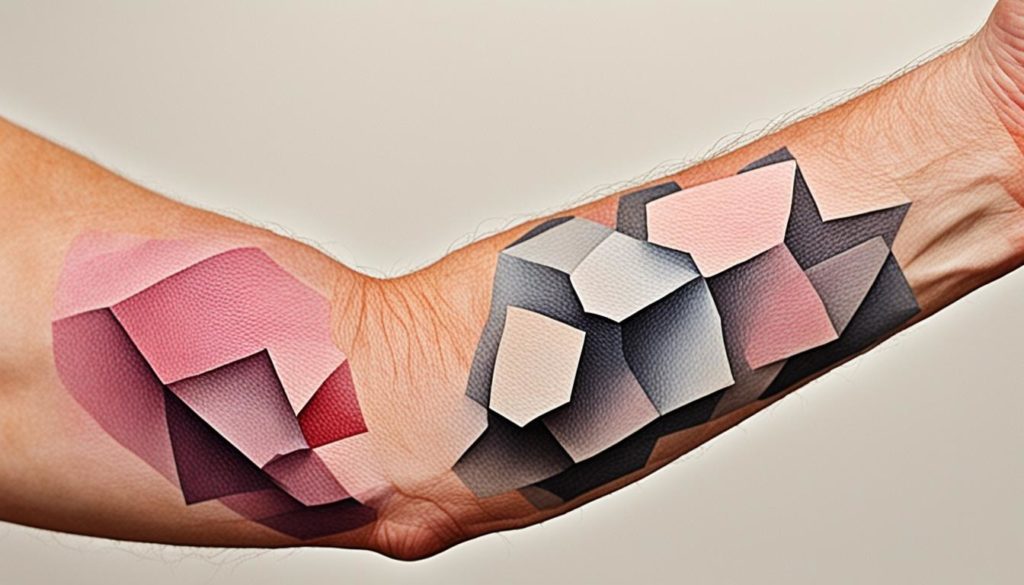Did you know nearly 10% of people in the U.S. deal with scaly skin? This condition shows up as dryness, flaking, and discomfort. It can hit anyone, no matter their age or skin type. Knowing how to fight scaly skin is key for keeping your skin glowing. We’ve put together a detailed guide on the best ways to treat scaly skin and daily tips for your skin care.
We’ll dive into what causes scaly skin and how to spot its signs. You’ll learn about various treatments you can try, both from the store and naturally. Adding expert advice and preventive steps to your skin care plan can help you beat scaly skin for good.
Key Takeaways
- Understanding the causes of scaly skin is the first step toward effective treatment.
- Identifying symptoms early can help prevent severe skin issues.
- Topical treatments and natural remedies provide various options for managing scaly skin.
- A consistent daily skincare routine is essential for keeping scaly skin under control.
- Professional dermatological advice can offer tailored solutions for severe cases.
Understanding the Causes of Scaly Skin
Scaly skin is a common issue that affects many people. It’s important to know why this happens to prevent and treat it effectively. Let’s look at what causes scaly skin and how the environment makes it worse.
Common Factors Contributing to Scaly Skin
There are several reasons why skin gets scaly. It could be because of genetics or the way we live. Here are the main reasons:
- Genetic Factors: If skin issues run in your family, like eczema or psoriasis, you might get scaly skin too.
- Medical Conditions: Illnesses such as diabetes, thyroid problems, and kidney issues can make your skin dry and flaky.
- Skincare Habits: Using harsh soaps, scrubbing too much, and not moisturizing can lead to scaly skin.

How Environmental Conditions Affect Skin Health
The environment plays a big part in skin health. Different outside factors can worsen scaly skin. Here are the key ones:
- Climate: Very cold or hot weather can remove moisture from your skin, causing dryness and scaling.
- Pollutants: Skin can get flaky and scaly from smog, dust, and chemicals in the air.
- Indoor Environment: Being in places with a lot of air conditioning or heat can dry out your skin and make it scaly.
To keep your skin healthy, it’s crucial to understand these factors. Knowing what affects your skin helps you choose the right skincare. This way, you can fight off the things that make your skin scaly.
| Factors | Impact on Skin |
|---|---|
| Genetic Predispositions | Increased likelihood of skin conditions such as eczema and psoriasis |
| Medical Conditions | Reduced skin hydration and increased dryness |
| Skincare Habits | Potential for skin barrier damage and moisture loss |
| Climate | Skin dryness due to extreme weather conditions |
| Pollutants | Skin barrier damage and increased flakiness |
| Indoor Environment | Dry skin from prolonged exposure to air conditioning or heating |
Identifying Symptoms of Dry and Flaky Skin
Understanding scaly skin symptoms and dry skin signs is key. Knowing them early can stop worse problems. It helps in picking the right skincare.

Visible Signs of Scaly Skin
Common signs of scaly skin are rough patches and skin that looks white or gray. There’s also dead skin on top. These signs may cause itching. Scratching a lot can lead to infections.
Commonly Affected Areas on the Body
Scaly skin usually shows up where the skin is often bare to the environment. The elbows, knees, shins, and back of the hands get it often. Knowing which parts are affected helps in dealing with it.
Effective Scaly Skin Treatments
Managing scaly skin starts with knowing the best treatments. Whether it’s medical treatments or products you buy at the store, the main goal is to tackle the root causes of your skin’s condition.
There are many flaky skin solutions that can greatly better your skin’s health. Let’s look at some top treatments:
- Topical Steroids: These are often used for serious cases. They help calm inflammation and make scaly areas smoother.
- Moisturizing Ointments: These deep moisturizers are key for skin hydration treatments. They hold in moisture and stop your skin from getting drier.
- Urea-Based Products: Urea gets rid of dead skin and helps your skin keep moisture.
- Retinoids: These boost new cell growth and make your skin feel smoother.
- Hyaluronic Acid: It’s great for hydrating your skin, making it much more moist.
To weigh out how effective and how to use different treatments, look at this comparison:
| Treatment | Purpose | Usage Frequency | Effectiveness |
|---|---|---|---|
| Topical Steroids | Reduce Inflammation | As prescribed | High |
| Moisturizing Ointments | Hydrate Skin | Daily | High |
| Urea-Based Products | Exfoliate and Moisturize | Daily | Medium |
| Retinoids | Promote Cell Turnover | Daily to Weekly | High |
| Hyaluronic Acid | Hydrate Skin | Daily | High |
Understanding your choices for treating scaly and flaky skin helps you make smart decisions. For skin hydration treatments and other care, always talk to a dermatologist to plan your treatment right.
Topical Treatments for Scaly Skin
Dealing with scaly skin means using the right creams and lotions. Picking the right products can really help your skin feel and look better. We’ll look into the top moisturizers and exfoliants that can help remove dead skin cells.
Best Moisturizers for Scaly Skin
Moisturizing plays a key role in managing scaly skin. It helps repair the skin’s natural layer and keeps it moist. Let’s check out some top moisturizer picks:
| Brand | Product Name | Key Ingredients | Benefits |
|---|---|---|---|
| CeraVe | Moisturizing Cream | Ceramides, Hyaluronic Acid | Restores skin barrier, prolonged hydration |
| Eucerin | Advanced Repair Lotion | Ceramide-3, Urea | Provides immediate relief, smooths rough skin |
| Neutrogena | Hydro Boost Water Gel | Hyaluronic Acid | Lightweight, non-greasy hydration |
Recommended Exfoliants to Remove Dead Skin Cells
Getting rid of dead skin cells is key. It makes your skin ready for other treatments. Here are some great options for smooth skin:
- La Roche-Posay’s Ultra-Fine Scrub: A soft scrub with perlite and glycerin. It exfoliates softly.
- Paula’s Choice Skin Perfecting 2% BHA Liquid Exfoliant: Salicylic acid clears pores and smooths skin.
- First Aid Beauty KP Bump Eraser Body Scrub: Uses chemical and physical exfoliants for rough areas.
Using the right moisturizers and exfoliants for scaly skin can greatly help. They are key to better skin health and appearance. This is vital for anyone with scaly skin issues.
Natural Remedies for Scaly Skin
Finding relief for scaly skin doesn’t need store-bought items. Many remedies can be made at home. These methods are simple and use household items for their calming and moistening effects.
Home Remedies to Soothe Dry Skin
For dry skin, natural ingredients with a long history of use are best. Here are some popular ones:
- Olive Oil: It’s known for its ability to moisturize. Just applying it onto the skin can offer relief.
- Coconut Oil: This is full of fatty acids that keep moisture in and reduce inflammation.
- Oatmeal Baths: Oatmeal can soothe and decrease itching and swelling.
DIY Masks and Treatments for Flaky Skin
DIY skincare means using natural ingredients and saving money. Here are a few recipes you might like:
- Honey and Yogurt Mask: Mix honey (2 tablespoons) with yogurt (1 tablespoon). Apply, wait for 20 minutes, then rinse with warm water. It hydrates and calms dry skin.
- Avocado and Olive Oil Mask: Combine one mashed avocado with two tablespoons of olive oil. Spread it on your skin, leave for 15-20 minutes, then wash off. It’s great for deep moisture.
- Banana and Honey Treatment: Blend a banana with a tablespoon of honey. Put it on dry areas for 20 minutes, then clean off. Honey’s moisture and banana’s vitamins make skin soft and smooth.
These DIY treatments are easy and effective for flaky skin. They help you get soft, healthy skin without commercial products.
Daily Skincare Routine for Managing Scaly Skin
To manage scaly skin well, you need a daily skincare plan. Being consistent is important. Let’s outline the key steps for keeping your skin moist and healthy.
Begin in the morning by washing your face with a soft, hydrating cleanser. This gets rid of overnight dirt without removing essential oils. Then, use a toner to add another moisture layer and prep your skin for what’s next.
After that, add a hydrating serum to your routine. Serums are thicker than toners but soak in fast. They send a deep moisture boost. Look for ones with hyaluronic acid for top hydration.
Moisturizing is very important for dealing with dry skin. Use a rich cream to moisturize well. Put it on your face and dry spots. It’s key to keep your skin moist, especially after cleaning.
Don’t forget to protect your skin. Always use sunscreen with SPF 30 or more, even on dark days or indoors. The sun’s UV rays can worsen scaly skin.
Keeping up with your skincare for face and body helps against dry, scaly patches. For extra tips, see this detailed guide.
In the evening, do the same but use a rich night cream instead of sunscreen. Night creams are made to hydrate deeply while you sleep.
In short, a thoughtful skincare routine with gentle cleaning, lots of moisture, and sun defense is vital for scaly skin. Stick to these steps for smoother skin.
How to Get Rid of Scaly Skin: Expert Tips
To fight scaly skin effectively, you need good skincare tips. These include staying hydrated and exfoliating regularly. By doing this, you can get smoother, healthier skin after a while. Now, let’s go over the key steps for keeping your skin in top shape.
Incorporating Hydration into Your Routine
One top expert skincare tip is focusing on hydration. This means hydrating your skin inside and out. Drink lots of water to keep your skin moist from the inside. For the outside, use moisturizers with hyaluronic acid or glycerin. They seal in moisture and fight off dryness.
Importance of Regular Exfoliation
Exfoliating regularly is key for dealing with scaly skin. By exfoliating once a week, you remove dead skin cells that build up. This makes it easier for your skin to soak up moisturizers. Choose gentle exfoliants with alpha hydroxy acids (AHAs) or beta hydroxy acids (BHAs) to prevent skin irritation.
- Hydrating skin practices should include using a humidifier during dry months.
- Exfoliating dry skin once or twice a week can keep skin smooth and healthy.
- Consulting with a dermatologist for personalized expert skincare tips can provide tailored solutions.
Preventive Measures to Avoid Scaly Skin
To avoid scaly skin, implementing the right measures is key. Protecting your skin from harsh elements and eating a skin-friendly diet are crucial. Let’s dive into these strategies.
Protecting Your Skin from Harsh Weather
Your skin might get dry and scaly due to bad weather. This includes low humidity, cold winds, and too much sun. Here’s how to protect your skin better:
- Use a humidifier during winter months to maintain indoor moisture levels.
- Wear protective clothing and apply sunscreen with a high SPF to shield your skin from UV rays.
- Opt for gentle, hydrating cleansers instead of harsh soaps that strip natural oils from your skin.
- Apply a heavy-duty moisturizer, especially those containing urea, petrolatum, or lactic acid, to lock in hydration.
Adding these habits to your daily life can lower the risk of scaly skin. Learn more about scaly skin treatment options to better your skincare.
Nutritional Tips for Healthy Skin
What you eat plays a big role in keeping your skin healthy. A diet good for your skin helps prevent scaly skin. Here are some tips:
- Consume foods rich in omega-3 fatty acids, such as salmon, walnuts, and flaxseeds, to enhance skin hydration.
- Include antioxidant-rich fruits and vegetables, such as berries, spinach, and sweet potatoes, to combat free radicals.
- Stay hydrated by drinking at least eight glasses of water daily to maintain skin elasticity.
- Limit intake of dehydrating substances like caffeine and alcohol.
Also, supplements like biotin and vitamin E might improve your skin’s health. Always check with a healthcare provider before starting any supplements.
By keeping up with these dietary tips and protecting your skin according to the weather, you can prevent scaly skin. This approach ensures your skin stays smooth and healthy throughout the year.
Consulting a Dermatologist for Scaly Skin
If you’re dealing with persistent scaly skin, seeing a dermatologist is key. A dermatologist for scaly skin will do a deep professional skin evaluation. They’ll find out why you have scaly skin and make a custom plan for you.
At a skin specialist consultation, your dermatologist will ask about your health history. They’ll want to know your skincare routine, what you eat, and where you live. This helps find any allergies, health problems, or external things that might be making your skin scaly.
- Initial Assessment: The dermatologist checks your skin closely.
- Medical History Review: You’ll be asked about past skin issues and your lifestyle.
- Diagnostic Tests: You might need tests, like skin biopsies or allergy checks.
- Treatment Plan: You’ll get a plan that might include creams, medicine, or changes in how you live.
Here’s what happens in a usual dermatologist for scaly skin consultation:
| Type of Evaluation | Description | Purpose |
|---|---|---|
| Visual Examination | Looking at the scaly skin’s texture, color, and area. | To figure out the skin problem and its extent. |
| Medical History Review | They ask about your health history in detail. | To find possible health issues or causes. |
| Diagnostic Tests | Could be a biopsy or blood checks. | To confirm the diagnosis and look for hidden issues. |
| Treatment Recommendations | A plan just for you, might include meds and new habits. | To take care of and improve your scaly skin. |
A professional skin evaluation not only tackles current skin issues. It also gives you ways to keep your skin healthy long-term. By going for a skin specialist consultation, you’re stepping towards better, smoother skin.
Conclusion
Dealing with scaly skin needs several steps. It’s important to know what causes it, from weather to what we eat. It helps to catch symptoms early and start care right away to avoid worse problems.
Finding the right treatment matters a lot. This could be creams or natural methods. Doing skincare every day helps keep scaly skin in check. It’s also key to stay moisturized and get rid of dead skin. If problems stay, seeing a dermatologist is a smart move.
Preventing scaly skin is also crucial. Protect your skin from bad weather and eat well. By following these tips, better skin health is within reach. This guide highlights why it’s important to tackle scaly skin from all angles.
FAQ
What causes scaly skin?
Scaly skin can come from different sources like genetics, health issues such as eczema, or outside effects. Things like dry air or strong chemicals can also cause it.
How can environmental conditions affect my skin health?
Environmental factors such as low humidity, extreme cold, or pollution can harm your skin. They remove natural oils, making skin dry and scaly.
What are the common symptoms of scaly or dry skin?
Scaly or dry skin shows up as noticeable scaling, flakiness, and itching. You’ll see it mainly on legs, arms, and the face.
What are the best moisturizers for scaly skin?
The top moisturizers for scaly skin have hyaluronic acid, glycerin, and ceramides. Brands like CeraVe, Eucerin, and Neutrogena are highly recommended.
Are there any effective home remedies for treating scaly skin?
Certain home remedies can help with dry, scaly skin. Try coconut oil, aloe vera, or DIY masks with honey and yogurt.
How often should I exfoliate scaly skin?
You should exfoliate 1-2 times a week to shed dead skin cells and encourage healthy skin. But, be gentle to avoid irritation.
What does a daily skincare routine for scaly skin look like?
A daily routine includes gentle cleansing and moisturizing. Also, use a hydrating serum and sunscreen to protect your skin.
When should I see a dermatologist for scaly skin?
If OTC products and home treatments don’t work, or if your condition worsens, see a dermatologist. They can offer more help.
How can diet affect scaly skin?
Eating foods rich in vitamin E, omega-3s, and antioxidants supports healthy skin. Drinking lots of water keeps the skin hydrated too.
What preventive measures can I take to avoid scaly skin?
To prevent scaly skin, moisturize regularly, dress for the weather, use sunscreen, and avoid long, hot showers.


